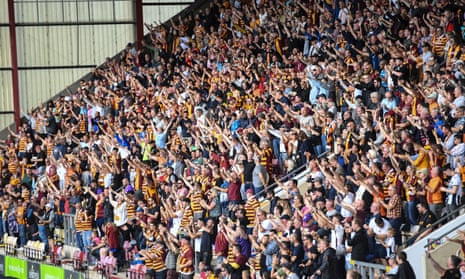This week marked the 30th anniversary of England’s failure to qualify for the 1994 World Cup under the late Graham Taylor, which was captured for the infamous fly-on-the-wall documentary An Impossible Job. The film was designed to show the extraordinary pressure an England manager faces, and there are plenty of clubs in the modern age who would argue their managerial position is saddled with similar weight of expectation, including the League Two side Bradford City.
The Bantams are again drawing average home crowds of more than 17,000 this season but what really counts to the city and fans is on-field matters. Relegated four times this century and promoted only once, they are without a manager again and in mid-table after the dismissal of Mark Hughes last week. There have been highlights in recent years, including two memorable cup runs under the stewardship of Phil Parkinson, but this club, its city and its healthy support crave football in a higher division.
Hughes’s appointment, the first time he had managed outside the Premier League, was supposed to be the one that yielded a turnaround in fortunes for a club approaching 20 years since they were last in the Championship. Initially, things looked promising. City made the League Two playoffs last season but defeat there by Carlisle appeared to take the wind out of Hughes’s sails. His slow, patient style regularly attracted criticism from fans and his departure had an inevitability to it.
“You could see the signals in the weeks leading up to him leaving,” the Telegraph and Argus’s chief sports writer, Simon Parker, says. “When [the appointment] happened, there was euphoria because it was such a big appointment and it put the club on the national map. But if you want to be critical you could argue Mark Hughes the manager hasn’t won anything. Without meaning to, he possibly underestimated the level. He didn’t look down his nose at it but I wonder if he found it harder than he thought it would be.”
Hughes’s managerial career is likely over and Bradford are hunting for their 10th permanent manager in less than six years. “It’s easy to criticise in hindsight but nobody criticised any of the recent appointments at the time,” Parker says.
Interest in the vacancy is healthy, with the youngest chief executive in the EFL, Ryan Sparks, considering applications from managers in and out of work. Having tried experienced promotion winners in Derek Adams and Gary Bowyer, young managers such as Mark Trueman and a headline name in Hughes, the club is understood to be open about the kind of manager who comes next. It is understood Scott Brown and Neil Lennon are among those interested.

Whoever inherits the seat being kept warm by the midfielder Kevin McDonald, who has won both his games in caretaker charge going into Saturday’s trip to AFC Wimbledon, takes on a job where promotion is the expectation and pressure is a guarantee. “The fans have got a right to feel like that because there’s 17,000 fans there,” McDonald says. “The pressure can eat you up if you get caught up in it.”
They also inherit a role where the club’s ownership is on the agenda. Stefan Rupp is far from the rack-and-ruin owners seen at other clubs but he is largely anonymous, remaining in Germany since buying the Bantams for about £5m in 2016 when they were on the verge of the Championship. He appears unwilling to sell at a cut price despite the fall in league position since his takeover, leading to frustration on the terraces.
after newsletter promotion
“His downfall is he wants too much for the club and the club owns nothing,” Parker says. “The asking price seems to be very high which puts off a lot of people.”
Hughes’s arrival came with fanfare but ended in a whimper; to avoid a sixth successive season in League Two, they will need the new man to hit the ground running and cope with the expectation that comes with this seemingly impossible job.

Comments (…)
Sign in or create your Guardian account to join the discussion